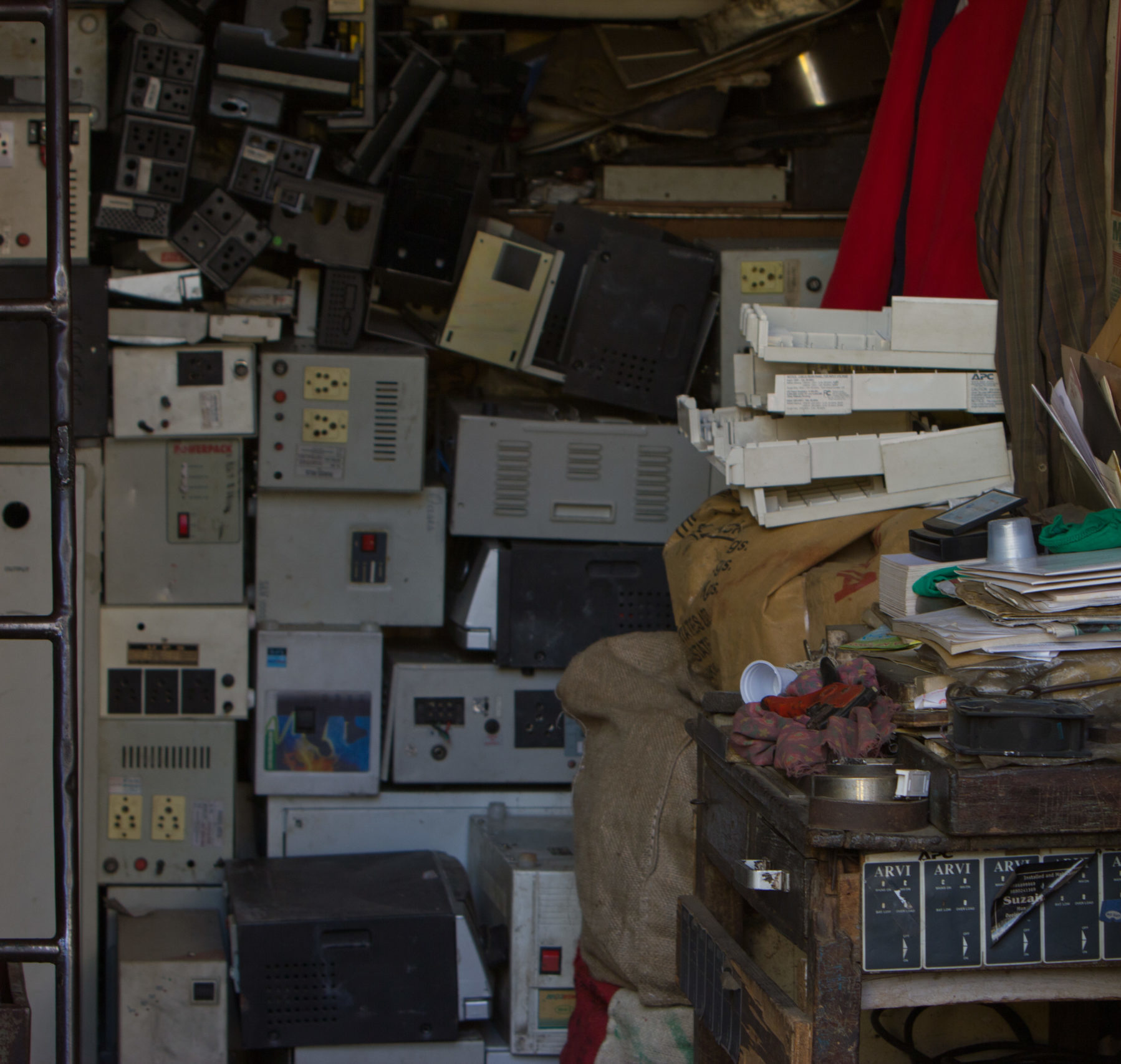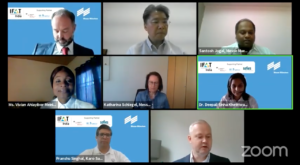
Picture Credit: Victorgrigas, India Victor Grigas 2011-12, Cropped, CC BY-SA 3.0
The recently released Global E-waste Monitor estimated that the world generated a phenomenal 53.6 million metric tons of e-waste or an average of 7.3 kilogram per capita last year. The total e-waste generation has increased by 9.2 million tonnes since 2014 while formally documented recycling grew only by 1.8 million tonnes, indicating that recycling activities are not keeping pace with the global growth of e-waste.
To discuss the opportunities, experiences and technological developments in this growing sector, a webinar on green business opportunities in the circular digital economy was organized on 8th July 2020, by IFAT India and Messe Munich, supported by UNU, UNITAR, and Sofies India. In case you missed it, here’s a round-up on the webinar, Enabling a Circular Digital Economy: Spotting Green business opportunities in the E-waste sector.
 Some very interesting discussions took place in the webinar moderated by the Managing Director of Sofies India, Dr. Deepali Sinha Khetriwal. Mr. Kuehr shared an unexpected outcome of the current global pandemic. E-waste collection has actually increased in some parts of Europe as people are clearing their houses during this period of confinement. Here are some of the key points made by each speaker:
Some very interesting discussions took place in the webinar moderated by the Managing Director of Sofies India, Dr. Deepali Sinha Khetriwal. Mr. Kuehr shared an unexpected outcome of the current global pandemic. E-waste collection has actually increased in some parts of Europe as people are clearing their houses during this period of confinement. Here are some of the key points made by each speaker:
- Ruediger Kuehr, Head of the United Nations Institute for Training and Research (UNITAR) Office Bonn and Director of the Sustainable Cycles (SCYCLE) Programme of United Nations University, Germany
Mr. Kuehr furnished an overview of the recently launched E-waste Monitor, which provides a comprehensive picture of the global waste challenge, national and regional analysis of e-waste quantities and flows, and makes predictions until 2030 and beyond. It also provides a summary of the legislative instruments in place currently. The report quantifies toxic additives of hazardous substances contained in e-waste and illustrates the improper management of e-waste which contributes to global warming. E-waste can also be considered as an urban mine that contains several precious critical and non-critical metals that if recycled can be used as secondary materials. In order to keep our supply chains function in the future, it is imperative that we collect and recycle e-waste.
- Cosmas Lu, Spokesperson, international strategy advisor, and precious metal trading, SDTI, Taiwan
Mr. Lu provided insights on recycling techniques employed by SDTI, a Taiwanese company that focusses on extracting precious metals from e-waste. Their focus is on the e-waste generated during manufacturing processes as well as post-consumer e-waste. They use chemical recycling techniques to extract the metals and are working to convert e-waste into building materials, furniture, and even artwork.

(Original text: Matthias Feilhauer (Benutzer: thousandways)), Ewaste-delhi, CC BY-SA 2.0 DE)
- Sebastian Frisch, Senior Partner and Founder of BlackForest Solutions GmbH, Germany
Mr. Frisch spoke about business opportunities and ideas while working with hazardous waste. His firm BlackForest Solutions assists in the export of hazardous waste from countries where there is no treatment facility to European countries, providing services such as on-site packaging labeling and notification management, in compliance with the Basel Convention. There is quite a demand for such solutions and services across Asia & Africa. With support from KfW, they are working on building a system to formalize the informal sector in Ghana. They are also developing a software tool that helps decision-makers manage e-waste across Indian cities.
- Vivian Ahiayibor Meinel, Managing Director, City Waste Recycling Ltd, Ghana
Sharing her experience in managing an e-waste recycling company in Ghana, Ms. Meinel discussed innovative approaches taken to tackle the e-waste problem. She felt that even though there is negativity surrounding this sector (with the infamous Agbogbloshie dump gaining worldwide attention), there exist a lot of opportunities in the areas of carbon trading, urban mining, and establishing EPR systems – collection, transportation, and recycling.
- Pranshu Singhal, Founder & Director, Karo Sambhav, India
Mr. Singhal elaborated upon his work with Karo Sambhav, working towards building a grassroots ecosystem for e-waste management in India. He stressed on the need to integrate the informal sector and create decentralized systems in order to manage e-waste locally. The government must set up recovery targets along with the collection targets to enable a circular economy. Another important point he raised was the need to ensure traceability and transparency along the entire e-waste value chain.
 While it is too early to deliberate on the aftermath of the crisis, there are encouraging signs to build back better. Citing the example of the EPR regulation for e-waste in India, Ms. Meinel proposed the same for Ghana. Mr.Lu recommended working with government bodies and academic institutions for better access to funding and technology. There was a consensus for local action, be it setting up of treatment facilities in developing countries or designing decentralized e-waste management solutions.
While it is too early to deliberate on the aftermath of the crisis, there are encouraging signs to build back better. Citing the example of the EPR regulation for e-waste in India, Ms. Meinel proposed the same for Ghana. Mr.Lu recommended working with government bodies and academic institutions for better access to funding and technology. There was a consensus for local action, be it setting up of treatment facilities in developing countries or designing decentralized e-waste management solutions.
Finally, when asked to wave an imaginary magic wand and share their hopes and dreams to improve the current e-waste situation, the panelists came up with broad-based yet realistic wishes. They ranged from global cooperation to a transparent platform for end-to-end data collection to green finance and to the creation of enabling environments for young entrepreneurs.
To view the full video, here’s the link to the webinar’s recording.



